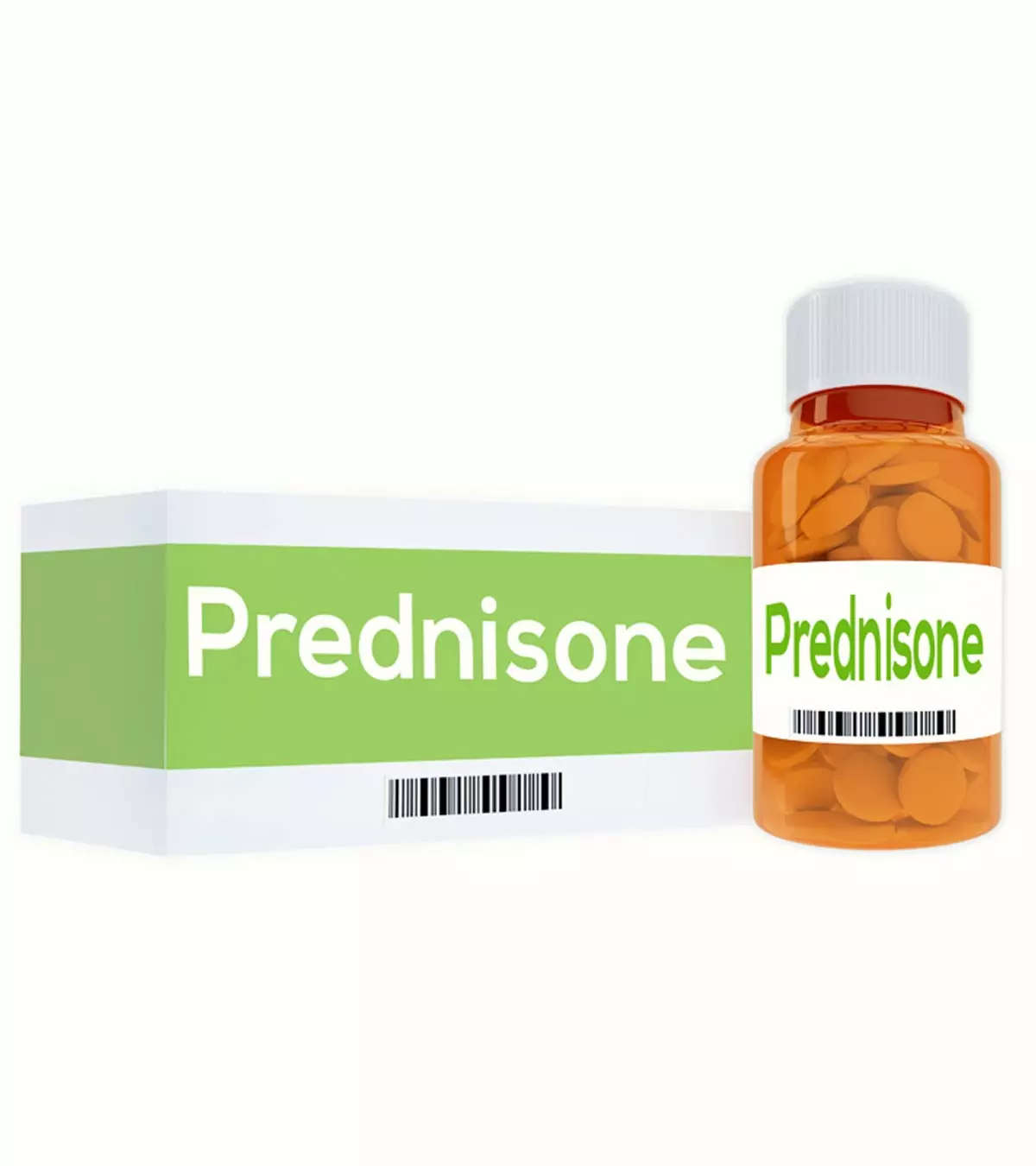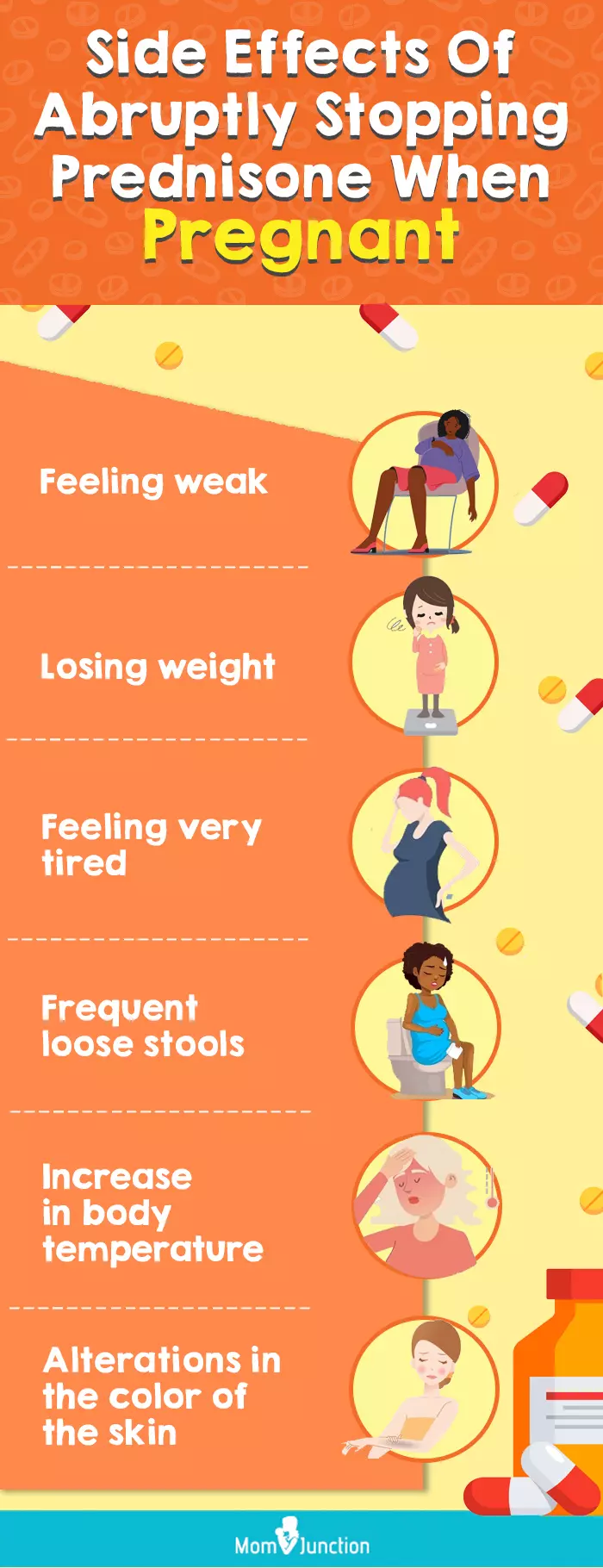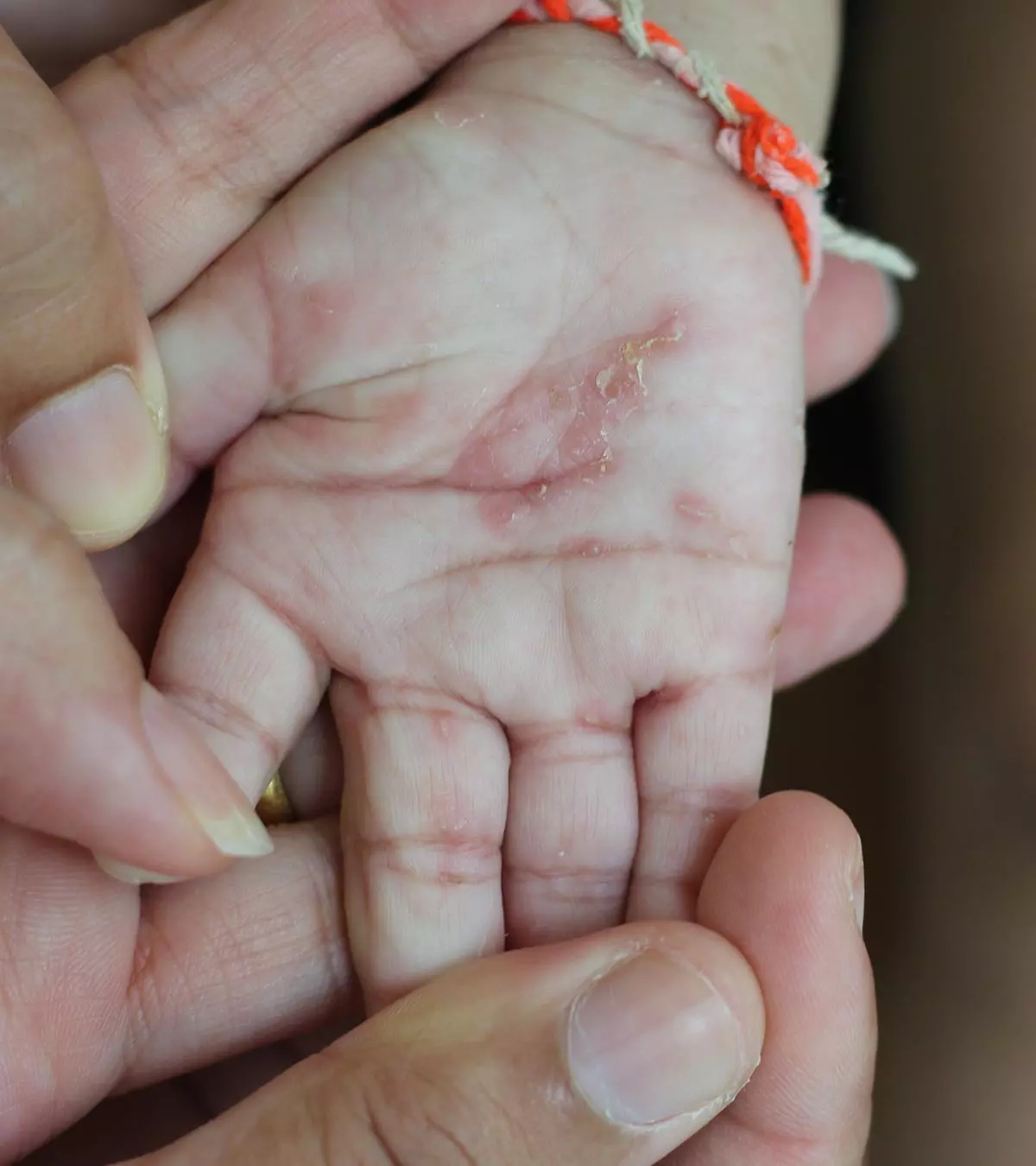
Image: ShutterStock
Prednisone is a corticosteroidiA group of steroid hormones produced in the adrenal cortex that are used for treatments in synthetic form to reduce inflammation. medicine used to manage disorders such as asthma, irritable bowel syndrome (IBS)iA digestive system disorder in which symptoms such as abdominal pain and frequent changes in bowel movement coexist. , and some autoimmune diseases (1). However, you may be concerned about using prednisone during pregnancy due to the fear of adverse effects on the developing fetus. Therefore, it is important to inform your doctor if you are pregnant or planning to conceive when on this medication.
In this post, we explain whether or not you can take prednisone while pregnant, when it is recommended, the recommended dosage, its possible side effects, and whether it causes withdrawal symptoms.
Key Pointers
- Prednisone is a medication used to treat autoimmune diseases, IBS, asthma, and skin conditions during pregnancy only if prescribed by a doctor.
- It can cross the placenta and studies on animals show negative fetal impact.
- Recommended dosage is under 20mg per day depending on the condition severity.
- Prednisone use can increase the risk of cleft lip in babies and cause weight gain, sleep disorders, high blood pressure, and vision changes in pregnant women.
- Prednisone is also used for infertility treatment in women but may cause congenital disabilities, preterm birth, and pregnancy loss due to its immunosuppressive action.
What Are Prednisone And Prednisolone?

Prednisone and prednisolone are synthetic corticosteroids, which work to suppress the inflammation and immune responses. Prednisone (a glucocorticoid) is broken down to prednisolone in the body, and both are helpful in treating various conditions, including endocrine disorders, autoimmune diseases, skin conditions, and asthma. These steroid medications mimic the activity of hydrocortisone, a natural corticosteroid produced by the adrenal glands.
They are suggested in different dosages based on the condition being treated and are available in the form of tablets, capsules, gels, inhalers, topical creams, eye drops, injections, and intravenous solutions (2).
Can You Take Prednisone During Pregnancy?

You can take prednisone while pregnant only if its potential benefits are more than the risks to you and the baby. The US Food and Drug Administration (FDA) lists it under Pregnancy Category C of drugs, which means animal studies have shown adverse effects on the unborn baby, and there are no well-controlled studies in humans (3).
Prednisone is said to cross the placentaiA temporary organ that develops during pregnancy and provides the fetus with oxygen and nutrients. , but the fetal effect is minimized by a placental enzyme (11beta-hydroxysteroid dehydrogenase type 2) (4). However, you should take this drug only if your doctor prescribes it to ensure safe prenatal care.
When Is Prednisone Recommended For Pregnant Women?
Your doctor would recommend the drug if the benefits outweigh the potential risks. It is prescribed in the case of:
- Autoimmune disordersiDiseases in which the body’s immune system mistakes healthy cells as foreign and attacks them. including systemic lupus erythematosus (SLE)iA disease in which the immune system targets its tissues, resulting in inflammation and tissue damage. , asthma, antiphospholipid syndromeiA condition where there is an increased tendency to form abnormal blood clots. and hepatitis.
- Severe allergic problems, where prednisone is prescribed in combination with other anti-allergic drugs (5).
- Hyperandrogenism, a condition of elevated male sex hormones in pregnant women. It happens when the fetus produces male hormones and enhances the androgen levels in the woman. This leads to decreased uterine tone and even pregnancy loss (6).
A healthcare professional may also prescribe prednisone as part of hormone replacement therapy for individuals with adrenal insufficiency.
 Quick fact
Quick factWhat Is The Recommended Dosage Of Prednisone For Pregnant Women?
The dosage of prednisone is different for different conditions. Your doctor might keep it under 20mg/day depending on the severity of the condition.
What Are The Possible Side Effects Of Prednisone During Pregnancy?

High dosage of prednisone is likely to cause some side effects as mentioned below:
- Studies have found that the potential teratogenicity of corticosteroids during pregnancy could moderately increase the risk of birth defects such as cleft lip caused by the drug (7) (8).
- According to research, up to 70% of patients reported an increase in body weight due to prolonged use of the drug. Almost 73% of patients complained of sleep disorders (restlessness and insomniaiA sleep disorder that makes it difficult to fall asleep, stay asleep, or get a sound sleep. ) after taking this medication(9).
- Other common side effects include a headache, irritability, sleeplessness, nausea, weight gain, and anxiety. Serious side effects could be high blood sugar, changes in vision, swelling in the feet or ankles (10).
Lisa, a mother of two from Minneapolis, shares her experience of dealing with high blood sugar levels after failing her glucose test during pregnancy. She explains, “I failed my glucose test (a test where they make you drink a super sugary drink and then test your blood sugar after an hour). After the fact, I learned that prednisone, which I take to keep my flares bearable, raises your blood sugar so I basically had no chance of passing. I decided to skip the 3-hour test because I would have had to go off prednisone for a week and that is just not possible with how bad my RA (rheumatoid arthritis) has been. Instead, I just had them give me a referral to an endocrinologist. Who knows if I technically have gestational diabetes or whether my sugars are artificially high due to the prednisone use. Either way, high blood sugar isn’t good for me or the baby so getting them under control is important. (i).”
 Point to consider
Point to considerDoes Prednisone Cause Withdrawal Symptoms?

Abrupt termination of the medication might result in general withdrawal symptoms such as weakness, extreme fatigue, slowed movements, fever, changes in skin color, salt cravings, weight loss, and diarrhea during pregnancy. To avoid these, take the doctor’s advice before you reduce the dosage or stop the medication (10).
Is Prednisone Used In Infertility Treatment For Women With Repeated IVF Failure?

Corticosteroids such as prednisone are used to treat infertility in women as they are believed to reduce the number of natural killer cells to facilitate conception. But these drugs suppress the immune responses as well, preventing the immune system from responding to pregnancy. Suppression of the immune system will increase the risks of congenital abnormalitiesiAn inherited illness that manifests at or before birth. , miscarriage and preterm labor (11).
Frequently Asked Questions
1. Does prednisone help prevent miscarriage?
A study on 80 women in 2006 indicated that combination therapy of prednisone, progesteroneiA female reproductive hormone that plays a vital role in menstruation, pregnancy, and breastfeeding. , aspirin, and folateiNaturally occurring form of Vitamin B9, responsible for protein metabolism and the production of red blood cells. ensures a higher live birth rate in women with idiopathic recurrent miscarriages (12).
2. How long does it take for prednisone to get out of my system after I stop taking it?
Prednisone gets out of your system within one day. However, its side effects may either not go away or take a long time to reverse (13).
3. How will prednisone affect my unborn baby?
Taking prednisone for a long time might adversely affect your baby, causing low birth weight or preterm delivery. However, it has not been confirmed whether these effects are because of the medication or the condition for which the medications are given. Therefore, doctors prescribe prednisone only when they feel its benefits outweigh the pregnancy risks (14).
4. Is it safe to take prednisone while breastfeeding?
If a nursing mother takes prednisone, it gets transferred into her breastmilk in small amounts and is at its peak under one to two hours after taking it. Studies show that while low doses don’t harm the baby, high doses can lead to a high accumulation of prednisone in the breast milk and decrease the breast milk supply temporarily. Therefore, it is advised to limit the dose of medication and wait at least four hours to breastfeed the baby after taking prednisone (16).
5. What should I do if I become pregnant while taking prednisone?
Prednisone is a corticosteroid medication for the treatment and management of diseases like asthma and skin conditions. If you become pregnant while taking prednisone, it is best to consult your doctor for any dose adjustments or alternatives (16). Do not stop the medication on your own.
Prednisone helps to manage inflammatory disorders like asthma and autoimmune conditions. However, using prednisone during pregnancy might need caution as it may adversely affect your health and fetal development. Experts suggest that prednisone should be used during pregnancy only when its benefits outweigh the risks. Therefore, if you are pregnant, inform your obstetric specialist and adjust the prednisone dosage accordingly. Taking the medication in a dose higher than recommended may cause cleft lip in babies and lead to sleep disorders, nausea, and headache in mothers. So, always check with your doctor to ensure optimal outcomes for you and your baby.
Infographic: Possible Withdrawal Symptoms Of Prednisone During Pregnancy
If your doctor has advised you to take Prednisone when pregnant, follow their instructions strictly and monitor your health closely. Also, discontinuing taking the medication suddenly may lead to side effects. Call your doctor immediately if you experience the withdrawal symptoms mentioned in the infographic below. Illustration: Momjunction Design Team
This post is for informational purposes only and is not a replacement for a doctor’s consultation. Do not use any medication without talking to your doctor.
Illustration: Can You Take Prednisone When Pregnant? Safety & Side Effects

Image: Stable Diffusion/MomJunction Design Team
Watch this video to gain insight into the definition and mechanism of action of prednisone. Additionally, explore the potential side effects associated with this medication.
Personal Experience: Source
MomJunction articles include first-hand experiences to provide you with better insights through real-life narratives. Here are the sources of personal accounts referenced in this article.
i. Pregnancy update: 30 weeks;https://lisasyarns.blogspot.com/2017/12/?m=0
References
1. Ping Li, Ying Zheng, and Xin Chen; Drugs for autoimmune inflammatory diseases: from small molecule compounds to anti-tnf biologics; NCBI (2017)
2. Drug record corticosteroids; National Institutes of Health; 2018
3. Center For Drug Evaluation And Research; US Food And Drug Administration
4. W. Kemp, J.P. Newham, J.G. Challis, A.H Jobe, and S.J. Stock; ; Human Reproduction Update, Vol.22, No.2, pp. 240-259
5. Quick reference from the working group report on managing asthma during pregnancy: recommendations for pharmacologic treatment; National Asthma Education And Prevention Program; 2004
6. Deepti Jain; Fertility and pregnancy outcome in a woman with classic congenital adrenal hyperplasia; BMJ Case Rep; 2013
7. Gretchen Bandoli, et.al.; A review of systemic corticosteroid use in pregnancy and the risk of select pregnancy and birth outcomes; NCBI (2018)
8. Park W, Mazzotta P, et al.; Birth defects after maternal exposure to corticosteroids: prospective cohort study and meta-analysis of epidemiological studies; Teratology; 2000
9. Miriam C, Pasquale V; Corticosteroid-related central nervous system side effects; J PharmacolPharmacother; 2013
10. Prednisone; U.S. National Library of Medicine; 2015
11. Steroid treatment for IVF problems may do more harm than good; The University of Adelaide; 2016
12. Clemens B Tempfer et al.; A combination treatment of prednisone, aspirin, folate, and progesterone in women with idiopathic recurrent miscarriage: a matched-pair study; U.S. National Library of Medicine; 2006
13. How long does prednisone stay in your system?; Vasculitis Foundation
14. Prednisone; Mother To Baby
15. Prednisone Pregnancy and Breastfeeding Warnings; Drugs.com
16. Mother To Baby | Fact Sheets; Prednisone/Prednisolone; NCBI (2022)
Community Experiences
Join the conversation and become a part of our nurturing community! Share your stories, experiences, and insights to connect with fellow parents.
Read full bio of Dr. Pamela Adhiambo Muga
Read full bio of shreeja pillai
Read full bio of Rebecca Malachi
Read full bio of Dr. Joyani Das





















